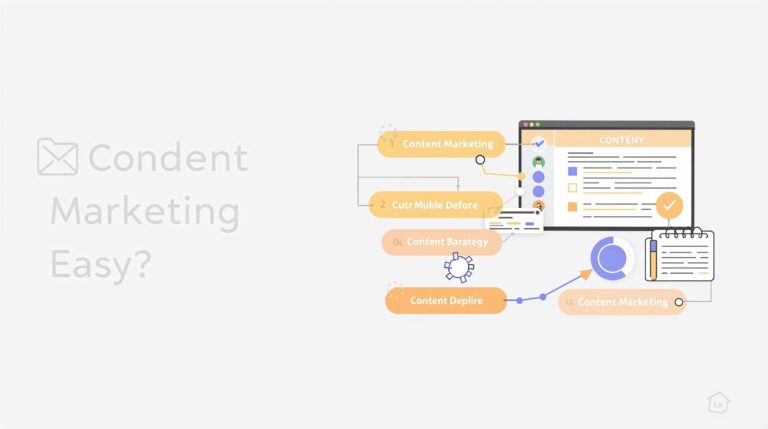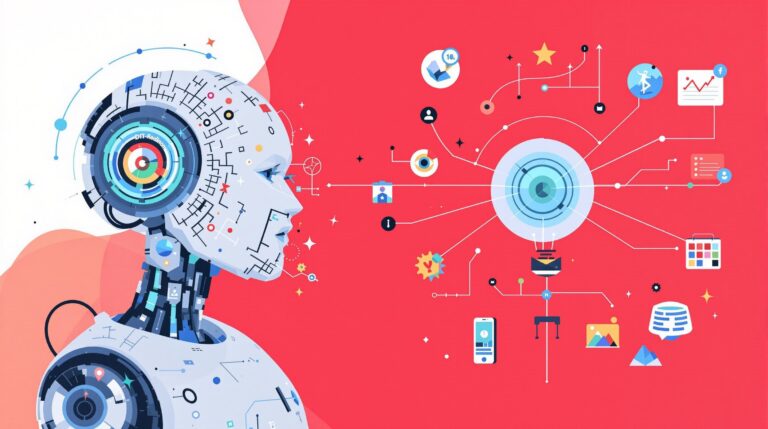SEO Content Automation: Can AI Really Help You Rank?
The remarkable rise of AI-powered SEO has revolutionized how content creators approach search engine ranking. SEO automation tools now offer unprecedented capabilities for content optimization, keyword research, and tracking across multiple dimensions of search marketing simultaneously.
Key Takeaways
- AI-optimized content ranks 30% higher within six months compared to manually crafted content
- 75.7% of marketers regularly use AI SEO copywriting tools for keyword research and optimization
- Businesses using AI for SEO report a 49.2% improvement in rankings after Google algorithm updates
- Content optimization software enables enterprises to produce 10x more content without proportional staffing increases
- Only 5% of marketers let AI create full articles, while 35% use hybrid approaches for better results
The AI SEO Revolution: What the Data Shows
The integration of artificial intelligence into SEO has fundamentally changed how digital marketers approach content creation and optimization. The numbers don’t lie – AI adoption in SEO has reached an impressive 75.7% of marketers who now regularly use these tools for various aspects of their SEO strategy. From generating keywords to creating content outlines and optimizing existing content, AI has become an indispensable assistant.
What’s particularly striking is the tangible impact on search rankings. Businesses that embrace AI for their SEO efforts report a 49.2% improvement in rankings following Google algorithm updates. This suggests that AI tools are increasingly adept at understanding and aligning with Google’s evolving standards. In fact, 74% of marketers believe AI improves search rankings precisely because it helps content align with Google’s algorithms.
One of the most compelling statistics shows that AI-optimized content ranks 30% higher within six months compared to manually crafted posts. This performance gap highlights how AI can generate blog posts that effectively satisfy both search engines and users.

How AI Transforms the SEO Content Creation Process
The content creation process has been completely reimagined through AI integration. Each step of the SEO workflow now benefits from intelligent automation, starting with keyword generation. Tools like SEO.ai’s Free Keyword Generator analyze search patterns to identify valuable long-tail keywords that might otherwise remain undiscovered through manual research.
For content drafting, platforms such as Byword and Jasper leverage GPT-4 technology to generate drafts optimized for both readability and search performance. These drafts serve as solid foundations that can be refined with human expertise. On-page optimization has also been revolutionized by tools like SE Ranking’s AI SEO Checker, which audits 94 different parameters including meta tags and internal linking structures.
The impact of AI on content creation is evident in the statistics: AI-generated content now accounts for 19% of blog posts and 25% of product descriptions in e-commerce. Additionally, semantic keyword clustering has become a powerful strategy enabled by AI, grouping related terms to improve topical authority across content.
Another notable advancement is in schema markup optimization. Pages using AI-driven schema markup see a 30% increase in featured snippet placements, significantly improving visibility in search results.
Proven Benefits: Efficiency, Scale, and ROI
The most immediate benefit of AI in SEO is the dramatic increase in efficiency. Marketers report saving 12.5 hours weekly by automating repetitive tasks like meta tag writing and rank tracking. This time saving allows marketing teams to focus on strategic initiatives rather than getting bogged down in technical details.
Scalability represents another crucial advantage. AI enables enterprises to produce 10x more content without proportional increases in staffing, making it possible to target vastly more keywords and topics than would be feasible with purely manual methods. This scaling capability is particularly valuable for businesses competing in crowded markets where content volume can be a competitive differentiator.
The ROI impact is equally impressive. About 40% of marketers attribute a 6-10% revenue boost directly to AI-powered SEO initiatives. This concrete financial return explains why 19.2% of companies now allocate over 40% of their marketing budget to AI-driven campaigns.
The benefits extend to user engagement metrics as well. AI-generated headlines can boost click-through rates by a remarkable 59%, as demonstrated by Danish news outlet TV 2 Fyn. Overall, 68% of businesses report higher content marketing ROI with AI tools compared to traditional methods.
The EEAT Challenge: Where AI Falls Short
Despite its impressive capabilities, AI faces significant challenges in meeting Google’s Experience, Expertise, Authoritativeness, and Trustworthiness (EEAT) standards. One persistent issue involves accuracy problems – AI tools may “hallucinate” statistics or misuse sources, requiring careful human oversight to ensure factual correctness.
Another limitation is the potential for generic output. Over-reliance on AI risks producing formulaic content that lacks the distinctive voice and perspective that helps content stand out in crowded search results. This issue has become more critical since Google’s 2025 Helpful Content Update, which specifically penalizes low-quality AI content lacking clear EEAT signals.
The statistics highlight these challenges: 25% of AI-generated pages lose traffic following Google updates due to being classified as thin content. Additionally, 48% of top news sites now block AI crawlers to protect their original content from being scraped and repurposed.
It’s telling that according to HubSpot’s State of AI Report, only 5% of marketers let AI create full articles without significant human intervention. Most successful teams use content automation alongside manual creation to get the best results.
Best Practices for Effective AI-Generated SEO Content
To maximize the benefits of AI while avoiding its pitfalls, successful marketers are adopting hybrid workflows that combine AI efficiency with human creativity. This approach has been shown to improve rankings in multiple case studies, including a notable SaaS finance example where human editors refined AI-generated content post-publication.
EEAT compliance is essential for AI content to perform well. This means adding author expertise signals, proper citations, and expert quotes to AI-generated material. These elements help establish credibility with both readers and search algorithms.
Continuous monitoring represents another crucial practice. Tools like SEO.ai’s Rank Tracking alert teams to ranking drops, enabling rapid adjustments when content performance declines. Additionally, A/B testing of AI-generated titles and meta descriptions can increase CTR by up to 59%, making it a valuable optimization strategy.
The most effective AI SEO strategies leverage Natural Language Processing to generate content aligned with search intent and EEAT principles. This helps explain why 37.5% of marketers rely on AI for keyword research, while a larger 63% use it to generate content outlines rather than complete articles.
Top AI SEO Tools for 2025
The AI SEO tool landscape has evolved rapidly, with several platforms emerging as leaders. SEO.ai offers advanced keyword clustering, competitor analysis, and a Content Optimization Engine that compares drafts against top-ranking pages. Its comprehensive approach makes it suitable for businesses at various stages of AI adoption.
SE Ranking stands out with its GPT-4-powered content audits, rankability reports, and AI SEO Checker that evaluates 94 different on-page parameters. Byword excels at scalable long-tail keyword content generation, making it valuable for businesses targeting niche markets.
For teams new to AI SEO, ChatGPT has become a popular entry point. It’s used by 69% of marketers for automating repetitive tasks like alt-text generation. More specialized tools like Writtent and Copy.ai can reduce content creation time by 70% compared to manual methods, bringing a typical 6-8 hour article down to under 2 hours.
Keywords Everywhere offers unique value through its “Rankability for SERP” metrics, which help marketers assess how likely specific content is to rank well based on how AI is transforming content marketing and search algorithms.
Adapting to the Future: AI SEO in 2026 and Beyond
The SEO landscape continues to evolve rapidly, with several key trends shaping the future. Voice search optimization will become increasingly important, with AI tools prioritizing conversational keywords that match how people verbally ask questions.
Multimodal content represents another significant trend. AI will increasingly integrate text, video, and infographics to dominate various SERP features. This approach acknowledges that search results now contain multiple content formats beyond traditional text.
Ethical AI guidelines are also likely to become more stringent. Despite concerns, 73% of consumers already trust AI content, suggesting that transparency rather than elimination of AI will be the focus of future regulations.
The data suggests widespread adoption, with 82% of businesses planning to implement AI SEO strategies by 2026. However, challenges lie ahead, as 28.11% of SERPs are projected to display AI Overviews, requiring optimization for zero-click searches.
Perhaps most concerning is the predicted 25% decline in traditional organic traffic by 2026 as AI chatbots increasingly answer queries directly. This shift will require content creators to adapt their strategies to remain visible in an evolving search ecosystem.
Implementing Your AI SEO Strategy: A Practical Guide
Developing an effective AI SEO strategy requires a structured approach. I recommend a step-by-step workflow: input seed keywords → generate drafts → optimize headers and images → audit the final content. This systematic process ensures AI tools are leveraged efficiently while maintaining quality control.
Real-world results demonstrate the potential of this approach. One B2B SaaS company scaled to 750,000 monthly visitors using AI to create content for 7,000+ long-tail keyword pages. Their success hinged on balancing automation with human creativity.
Tools like SEO.ai provide significant advantages through real-time SERP analysis, identifying gaps in competitors’ content. AI’s ability to process 200+ Google ranking factors simultaneously gives it an edge over manual analysis, which typically focuses on a much smaller set of variables.
When implementing your strategy, it’s essential to measure success through multiple metrics. Rankings alone don’t tell the full story—traffic analytics and conversion metrics provide deeper insights into performance. This comprehensive measurement approach helps refine your AI SEO strategy over time for maximum impact.






